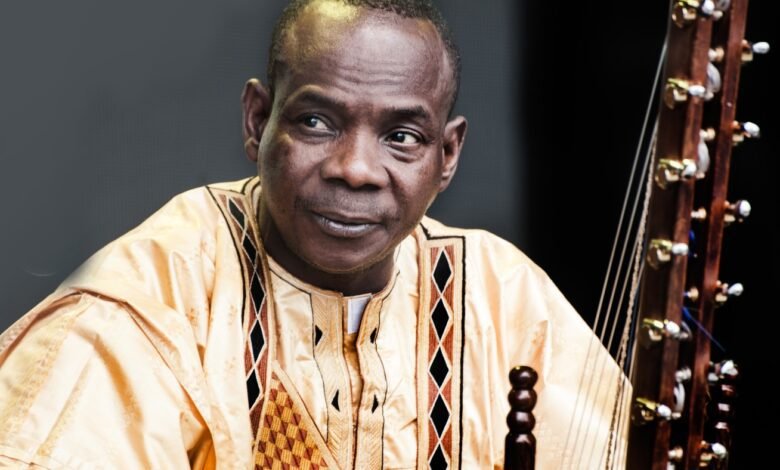Goats and Soda: NPR


Musician Toumani Diabaté from Mali and his 21-string kora, pictured at WOMAD — the annual World of Music, Arts and Dance festival held in the United Kingdom. Diabaté died on July 19 at the age of 58.
Judith Burrows/Getty Images/Hulton Archive
hide caption
toggle caption
Judith Burrows/Getty Images/Hulton Archive
“He played those 21 strings with love.”
This is the great American banjo player Bela Fleck talking about his duets with Toumani Diabaté of Mali — including the popular hit “Dueling Banjos.”
Fleck called him “one of the greatest sidemen I have ever played with.”
It is one of many heartfelt tributes to Diabaté, who died of kidney failure in July. Diabaté was 58.
His death reverberated around the world, with many musicians expressing how deeply his life impacted them.
“Toumani was a guardian of our culture, but also a bold innovator who never stopped pushing the boundaries of his art,” Malian singer Oumou Sangaré wrote on her Instagram page. “His passing leaves a huge void in our hearts, but his musical legacy will continue to resonate within us and inspire generations to come.”
As a father and mother…
Toumani Diabaté was born into a centuries-old family of griot musicians, who preserved the stories and traditions of Mali’s Mandé empire, once the largest in West Africa, through their music. His father, Sidiki Diabaté, was the leading kora player in the years following Mali’s independence from France in 1960, and his mother, Nene Koita, was an accomplished singer.
Diabaté, who was always expected to continue his family’s long-standing musical legacy, taught himself to play his father’s instrument.
His technique was vividly demonstrated on his groundbreaking solo albums, Kaira (1988) and The Mandé Variations (2008). In Kaira —which was released shortly after he turned 21—his graceful shifts between melody and bass always sounded as if he was singing as much as playing.
Diabaté also created a more expansive project called the Symmetric Orchestra. This large ensemble brought together instruments and repertoire from across the former Mande Empire with added textures and punch from American and European strings and brass. Diabaté included original compositions alongside new adaptations of griot songs.
As Diabaté wrote in the liner notes for the orchestra’s 2006 album, Independence Boulevard“One of Symmetric’s philosophies is the meeting of generations. The old generation has its experience in music, the new generation has its madness in music.”
Diabaté’s enthusiasm for improvisation and sharing kora music around the world has led to several successful collaborations. He has recorded with legendary Malian guitarist Ali Farka Touré and another great kora player, Ballake Sissoko. Diabaté has also worked with artists whose backgrounds differed from his own. These collaborations have included jazz and blues musicians, Spanish flamenco groups, and the London Symphony Orchestra.
Taj Mahal: ‘It was as if 500 years of separation no longer existed’
Through his music, he promoted his own heritage while also helping to show how much that culture was part of a shared language. Blues guitarist Taj Mahal and Diabaté teamed up for the 1999 album Kulanjan together with a small group of Malian musicians. The album features a rich blend of American acoustic folk and blues alongside Malian musical styles. Mahal’s raspy voice creates a compelling contrast to the higher registers of the Malian instrumentalists and singers. Despite their seemingly different styles, Mahal found a mutual musical understanding in their collaboration.
“It was never like, ‘You play this, I’ll play that.’ We just played together, looked at each other and that was it. It was as simple as that. It was like 500 years of separation didn’t exist anymore,” Mahal said.
Béla Fleck collaborated with Diabaté for a series of concerts in 2009. Some of the performances are included on his album, The cascade effectwhich was released in 2020. A sense of joy comes through in its rapidly changing rhythms and shared sense of humor, evident in moments like Diabaté’s playful musical response to Fleck’s snippet of “Oh, Susannah” on the track “Kauonding Sissoko.”
“Toumani was incredibly sweet from the beginning. He always called me ‘my brother,’ which made me feel very privileged,” Fleck said. “Toumani had elegance. That’s what I think about, and that incredible touch of his.”
‘A great artist who belongs to the world’
Iranian kamancheh player Kayhan Kalhor was one of Diabaté’s most recent collaborators, with his duet album, The sky is the same color everywherereleased last year. The duo began with an invitation to perform together at the Morgenland Festival in Osnabrük, Germany, where they met just hours before the first show. The album was recorded after a brief European tour, but their musical interplay suggested a much longer partnership.
“We come from two different cultures that view music in the same way. Improvisation is one of the main aspects. The other aspect is that our musical cultures go back a long way,” says Kalhor. “When you are so deep in the culture and know the music of that culture very well, it gives you the freedom and the vision to add to it. So it’s not surprising that a musician of Toumani’s caliber and stature would add something to the music that the younger generation uses.”
Kalhor added that while Diabaté is part of Mande culture, his music connects with everyone.
“Vincent Van Gogh, Paul Cézanne, Akira Kurosawa and Abbas Kiarostami are great artists who belong to the world,” Kalhor said. “So I don’t see Toumani as a kora player from Mali, I see him as a great artist who belongs to the world.”
Aaron Cohen is the author of Move On Up: Chicago Soul Music and Black Cultural Power (University of Chicago Press) and Amazing Grace (Bloomsbury). He teaches humanities and English composition at City Colleges of Chicago and writes regularly about the arts for publications such as Chicago Tribune, Chicago Reader It is Sad.



